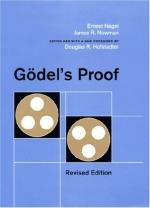|
This section contains 4,505 words (approx. 16 pages at 300 words per page) |

|
Dictionary of Literary Biography on Ernest Nagel
From about 1945 to 1965 Ernest Nagel was generally regarded as one of the two or three foremost philosophers in the United States. Noted primarily as a philosopher of science, he devoted the greater part of his work to an explication of the logic, the rational structure, the objectivity, and the tests of science. Although he avoided the label of "pragmatist," his ideas about science were largely guided by the notions of Charles Sanders Peirce and John Dewey that inquiry begins in response to a specific problem, and its conclusions are fallible and subject to revision in the light of further evidence; science is thus self-corrective. Nagel's defense of empirical procedures and naturalism was steadfast throughout his life.
Nagel was born on 16 November 1901 in Nové Mesto, Bohemia (then part of Austria-Hungary, today part of the Czech Republic), to Isidor Nagel, a shopkeeper, and Frida Weisz Nagel. He told Estelle...
|
This section contains 4,505 words (approx. 16 pages at 300 words per page) |

|


